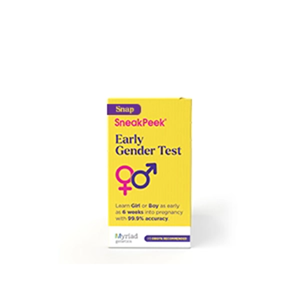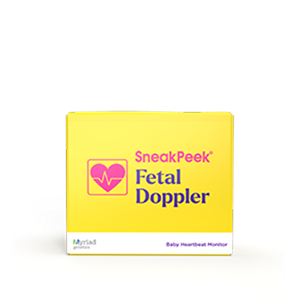Published on April 30th, 2022 and Updated on February 29th, 2024
Check out SneakPeek Gender Test to find out your baby’s gender as early as 6 weeks at over 99% accuracy1!
When you hear “egg quality”, you might think of the perfect soft scramble. However, egg quality can also refer to your own human eggs—a.k.a., the start of your precious baby.
For moms-to-be, healthy egg quality is a crucial (and understated) driver of fertility. The better your egg quality, the more likely you are to become pregnant and have a healthy baby. Can you improve poor egg quality? Luckily, the answer is a big yes.
Why is egg quality important?
First, egg quality measures the chromosomal health of your eggs or oocytes. Less chromosomal health can lessen the chance of implantation, when a fertilized egg latches onto your uterine lining, and risk genetic disorders like Down Syndrome.
What impacts egg chromosomal health? Mostly two factors—age and lifestyle.
To ovulate, your body helps your oocytes grow into mature eggs through the process of meiotic cell division (aka egg growth). However, as we age, our bodies can’t carry out this cell division as effectively, which leads to genetic errors. This can stack up over time—once a woman reaches 40 years old, about three quarters of her mature eggs will have chromosomal abnormalities. This means that many of her eggs won’t result in a viable pregnancy.
Fortunately, you can learn how to improve egg quality and help delay this natural loss of egg quality by changing a few lifestyle habits.
#1 Avoid Toxic Substances
What you put into your body when you’re not pregnant is just as important as what you put into your body when you are. Carcinogenic and toxic substances can potentially accelerate egg loss, reduce implantation odds, and spur ovulatory errors. While the risk isn’t black-or-white, experts advise caution around these common vices for future moms:
- Tobacco – If there’s one vice to eliminate for egg quality, it’s smoking. The mix of carcinogens, nicotine, and tobacco in cigarettes has been shown to speed up egg loss—permanently. One study found that for every year a woman smokes over 10 packs of cigarettes, she loses 2.5 mature, ovulation-ready eggs and 2 embryos, on average.
- Alcohol – Most know excessive alcohol intake is off the table for pregnant women. What about moderate alcohol intake for women looking to become pregnant? Does a nightly glass of wine have consequences? In short, it might. One study showed four or more alcoholic drinks per week correlated with lower IVF birth rates. Another study found higher alcohol consumption correlated with infertility risks. It’s also important to learn how alcohol can affect a pregnancy test if you are looking to become pregnant.
- Recreational drugs – In general, recreational drugs are no-no’s during pregnancy. However, they’re also risky for fertility and egg quality. One study found that women who used marijuana had a higher risk of ovulatory abnormalities.
#2 Adopt a Fertility Diet
To carry a new life one day and have a healthy pregnancy, your body needs fuel that’s nourishing and supports egg quality, egg maturation, and a positive fertility outcome, almost all fertility research backs a balanced Mediterranean diet, with plenty of the following unprocessed foods:
- Greens – Such as kale, spinach, collard greens, and arugula.
- Whole grains – Such as whole-wheat bread, farro, beans, and brown rice.
- Lean protein – Such as chicken, lean beef, fish, yogurt, and eggs.
- Low-sugar fruits – Including apples, blueberries, raspberries, strawberries, and melon.
- Unsaturated fats – Such as avocado, olive oil, nuts, and seeds.
- Vegetables – Including broccoli, bell peppers, onions, eggplant, brussels sprouts, and zucchini.
While there’s no food that’s completely off-limits on a fertility diet, there are certain foods that have been linked to lower fertility outcomes. So, it may be helpful to limit your intake of these foods if you want to preserve your egg quality:
- Trans & saturated fats – These can be found in fatty meats, butter, packaged desserts, and packaged cheese.
- High-glycemic foods – Such as candy, baked goods, and white or low-fiber carbohydrates.
- Processed meats – Such as sausages, hot dogs, lunch meat, and salami.
- High-sodium foods – Such as canned food and soups, frozen meals, and packaged snacks.
#3 Move Your Body
Like diet, exercise is a fertility balancing act. To improve your egg health, it’s best to strike a middle ground between couch potato and pro athlete.
Research shows that regular workouts—about 30 to 60 minutes of vigorous exercise a day—support ovulation. This is due to exercise’s fertility-boosting benefits, such as:
- Increased blood flow to ovaries
- Lower cortisol levels
- Greater hormonal balance
- Improved insulin resistance
- Better bodyweight management
In fact, exercise could even partially heal damaged or low-quality oocytes.
To make the most out of your egg quality-boosting mission, pick a daily activity that leaves you feeling energized and happy, including weight-lifting, hiking, dancing, or playing tennis.
#4 Maintain a Healthy BMI
Speaking of working out, maintaining a healthy BMI may also help improve your egg quality. When it comes to bodyweight and fertility, the Goldilocks rule applies—you don’t want to have too little bodyweight, but you also don’t want to have too much. A medically “average” weight is what best supports overall fertility and egg quality.
Time and time again, research has linked obesity to lower fertility. Why?
Excess body fat increases oxidative stress and estrogen, disrupting hormone production and ovulation. In fact, compared to women of average weight, overweight women (above 24 BMI) take 17% to 39% longer to conceive, due in part to these disruptions in hormone production and ovulation. Even with regular ovulation, however, women with a BMI of 29 or higher had lower chances of conceiving, pointing to reduced egg quality as another culprit.
The flipside? Underweight women also face fertility issues. A too-low body fat percentage tells your brain, “We can’t support a baby!”, lowering estrogen to abandon ovulation. On average, women below 18.5 BMI take 25% longer to conceive than women at a normal BMI.
If your weight sits outside the normal 20 to 24 BMI range, don’t worry—you can consult a medical professional about ways to safely adjust your weight.
#5 De-Stress Your Day (and Night)
Skipping your lunch breaks? Working on four hours of sleep? To stay healthy, you and your little eggs need some serious relaxation time.
Without proper rest, there can be hormonal imbalance and inflammation—two major enemies of egg quality. Fortunately, you can help create a calm home for your eggs with these de-stressing tips:
- Sleep for 7 to 8 hours a night – Egg quality is directly related to sleep. This is because during rest, your body has the capacity to fix and repair cells, including your oocytes. Regular sleep also releases melatonin, a hormone that crucially supports embryo development and ovulation. In fact, one study by the National Sleep Foundation found that women who slept 7 to 8 hours per night were 15% more likely to conceive via IVF than women who slept less.
- Make time for relaxing activities – Chronic stress elevates your cortisol levels and lowers estrogen, reducing your overall oocyte quality over time. To combat stress, try adding a few enjoyable and calming activities to your daily routine, such as yoga, game nights, meditation, or journaling.
- Try acupuncture – For some, pointy needles might feel like a stressful concept. However, research shows a promising link between acupuncture and increased fertility. For IVF patients, in particular, regular acupuncture can possibly boost pregnancy rates. Acupuncture can also lower the body’s cortisol and stress response, helping to support regular ovulation.
#6 Add a Few Handy Supplements
Most colorful and unprocessed diets will provide your body with the nutrients it craves. But to boost egg quality, a few dietary supplements can help take you the extra nutritious mile. Knowing what kind of supplements to take and when to start taking prenatal vitamins can be powerful in changing the quality of your eggs.
Luckily, most fertility supplements are accessible and affordable. Scan your local grocery store, drugstore, or health food store for these fertility-boosting choices:
- Omega-3s or fish oil – You can find omega-3s under nearly every supplement recommendation list—and they deserve the spot. This fish-based oil has high quality EPA and DHA, two fatty acids that potentially prolong a woman’s fertile years and egg production. Omega-3s also reduce inflammation and support metabolism, two factors that boost egg quality.
- Co-Enzyme Q10 (Coq10) – Recommended by many fertility experts, Coq10 is a powerful antioxidant that protects egg chromosomes against damaging free radicals. This antioxidant activity has been shown to improve ovulation and embryo quality, even in women with low egg counts.
- Vitamins A & E – Two more antioxidants, vitamin A and vitamin E can both improve mitochondrial function in oocytes. Translation? When you have higher levels of these vitamins in your egg’s surrounding follicular fluid, that egg is more likely to be fertilized.
Taking the First Steps with SneakPeek
Whether you’re undergoing IVF treatments with a fertility specialist or working to conceive naturally, you can increase your chances of becoming pregnant and giving birth to a healthy baby by improving your egg quality. Ultimately, when you take care of your body, you can turn it into a loving home for your future baby.
Once your future baby is nestled safely in that home, you can learn whether you’re having a baby boy or girl with the SneakPeek At-Home Early Gender Blood Test. Our at-home gender test is the #1-OBGYN recommended test, trusted by over 1 million moms. Why?
It’s the only text that can tell you the sex of your baby with clinically-proven over 99% accuracy1 as early as 6 weeks. That’s nearly as soon as you find out you’re pregnant and weeks before your 20-week anatomy ultrasound can tell you!
Plus, your data and results are privacy protected, you can take the test in the comfort of your home or in the privacy of a doctor’s office, and we offer a 100% money back guarantee if your results don’t match your baby’s sex at birth.
Take control of your present to improve your egg quality, then sneak a peek into your future, with SneakPeek Test.
This post has been reviewed for accuracy by the following medical professional:
Dr. Heather Soper, Certified Nurse Midwife
Dr. Heather Soper brings over 15 years of experience in women's health and obstetrics to her role as the owner of The Genesis Resort for Birth. Complementing her clinical practice, she serves as an Assistant Professor of Nursing at James Madison University, where she educates nursing students with a focus on compassionate, patient-centered care. Her advanced training and dedication to midwifery are evident in her contribution to both academia and the wellness of expectant mothers
Sources:
- BBC. How far can female fertility be extended? https://www.bbc.com/future/article/20200828-how-fertility-changes-with-age-in-women
- Fertility and Sterility. Effects of alcohol consumption on female fertility during an 18-year period. https://www.fertstert.org/article/S0015-0282(03)02717-1/fulltext
- Healthline. 17 Science-Based Benefits of Omega-3 Fatty Acids. https://www.healthline.com/nutrition/17-health-benefits-of-omega-3
- LA IVF Clinic. Sleep and Fertility: Why Getting Those ZZZZ’s Are So Important. https://laivfclinic.com/blog/sleep-and-fertility-why-getting-those-zzzzs-are-so-important/
- Mayo Clinic. Female fertility: Why lifestyle choices count. https://www.mayoclinic.org/healthy-lifestyle/getting-pregnant/in-depth/female-fertility/art-20045887
- NIH. An internet-based prospective study of body size and time-to-pregnancy. https://www.ncbi.nlm.nih.gov/pmc/articles/PMC2794667/NIH. Effect of Alcohol Consumption on In Vitro Fertilization. https://www.ncbi.nlm.nih.gov/pmc/articles/PMC4487775/
- NIH. Effect of Exercise on Ovulation: A Systematic Review. https://pubmed.ncbi.nlm.nih.gov/28035585/
- NIH. Follicular fat-soluble vitamins as markers of oocyte competency. https://pubmed.ncbi.nlm.nih.gov/32057251/
- NIH. Impact of stress on oocyte quality and reproductive outcome. https://www.ncbi.nlm.nih.gov/pmc/articles/PMC4812655/
- NIH. Obesity affects spontaneous pregnancy chances in subfertile, ovulatory women. https://pubmed.ncbi.nlm.nih.gov/18077317/
- NIH. Pretreatment with coenzyme Q10 improves ovarian response and embryo quality in low-prognosis young women with decreased ovarian reserve: a randomized controlled trial. https://www.ncbi.nlm.nih.gov/pmc/articles/PMC5870379/
- NIH. Prolonging the female reproductive lifespan and improving egg quality with dietary omega-3 fatty acids. https://www.ncbi.nlm.nih.gov/pmc/articles/PMC5624332/
- NIH. Recreational drug use and the risk of primary infertility. https://pubmed.ncbi.nlm.nih.gov/2081252/
- NIH. The effects of smoking on ovarian function and fertility during assisted reproduction cycles. https://pubmed.ncbi.nlm.nih.gov/8885914/
- NIH. The Effects of Voluntary Exercise on Oocyte Quality in a Diet-Induced Obese Murine Model. https://www.ncbi.nlm.nih.gov/pmc/articles/PMC4821597/
- NIH. The impact of obesity on egg quality. https://www.ncbi.nlm.nih.gov/pmc/articles/PMC3158259/
- Office on Womens Health. Weight, fertility, and pregnancy. https://www.womenshealth.gov/healthy-weight/weight-fertility-and-pregnancy
- Parents Magazine. TTC? 7 Real Ways to Improve Your Egg Quality for Better Success. https://www.parents.com/getting-pregnant/trying-to-conceive/tips/ttc-7-real-ways-to-improve-your-egg-quality-for-better/
- TIME. Needle This: Study Hints at How Acupuncture Works to Relieve Stress. https://healthland.time.com/2013/03/15/needle-this-study-hints-at-how-acupuncture-works-to-relieve-stress/
- USC Fertility. Female Egg Quality – IVF Success Rate. https://uscfertility.org/fertility-treatments/female-egg-quality/

Shop Our Products
SneakPeek aims to provide the most accurate and up-to-date information to help our readers make informed decisions regarding their health before, during, and after pregnancy. This article was written based upon trusted scientific research studies and/or articles. Credible information sources for this article are cited and hyperlinked.






